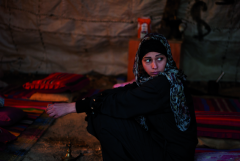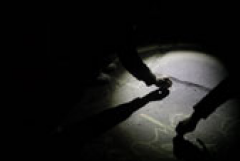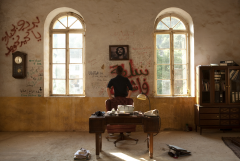Programmation Mediapart : Moyen-Orient

En 2010, Médiapart avait invité des écrivains à venir à La Roche-sur-Yon présenter des films les aidant à réfléchir et à travailler. Cette année, la collaboration se développe, entre le festival et le site d’information créé il y a bientôt cinq ans à l’initiative, notamment, d’Edwy Plenel.
Dans son club, Médiapart a ouvert une édition participative entièrement dédiée au festival, sur laquelle sont disponibles informations, archives, images et sons extraits des éditions passées et, bientôt, de celle-ci. Dans le même temps, la rédaction et le festival ont sélectionné ensemble trois films dont le point commun est de concerner le Proche ou le Moyen-Orient. Deux d’entre eux, il est capital de le signaler, ont été présentés en première mondiale cette année au FID Marseille. Il ne s’agit pas seulement d’un choix d’occasion, en rapport avec une actualité à laquelle Médiapart prête une attention toute particulière. Il s’agit aussi d’un choix esthétique : au présent ou au passé, à travers le documentaire ou la fiction – voire le recours à des marionnettes ! –, depuis la France ou Israël, la manière singulière dont il est question du Proche ou du Moyen-Orient dans ces films nous a semblé pouvoir se prêter à des discussions mêlant les enjeux du cinéma et ceux de la politique, les enjeux d’un festival et ceux d’un journal d’information quotidienne.
Les trois films seront présentés à La Roche-sur-Yon par des rédacteurs de Médiapart . Ils circuleront ensuite, toujours accompagnés, dans plusieurs salles de l’ouest, à la fin de l’année 2012 et dans les premiers mois de 2013. Nous travaillerons ainsi à mieux les faire connaître et partager, à susciter l’intérêt de possibles distributeurs. Et nous essaierons de porter un regard neuf sur les rapports entre journalisme et cinéma. Journalisme et cinéma, la salle et l’Internet : ce partenariat, que nous espérons voir se développer encore à l’avenir, est l’occasion de donner au festival un prolongement, une dimension de plus.
Sharqiya Première Mondiale
- De Ami Livne
- Avec Adnan Abu Wadi, Maysa Abed Alhadi, Adnan Abu Muhareb, Eli Menashe
-
Israël. 2012 . 1h 22 min . Digibéta
Sharqiya's power comes from several inversions. Kamel is a Bedouin. He lives with his sister-in-law and his brother in an unauthorised village set up in the desert of southern Israel. It's barely a village, just several sheet-metal shacks furnished with knick knack, found objects, and salvaged material. These huts are invaluable things that the authorities are about to level, however, and that the inhabitants will have to build again, as though nothing had occurred, waiting for the next destruction. This is the first inversion that aims to show exile, expropriation, and the blind labour of diggers, not in Palestine but in Israel. Then comes the second inversion, the man is required to keep watch over the others. Kamel is a guard. He, whose life is utter misery, is in charge of the bus station security. The third inversion is the most striking. Kamel has an idea. He doesn't voice it, but the audience follows precisely its course with his gestures and his looks. His idea is to plant a bomb in a station. To give himself like the one who found it, to act as a hero in front of the camera. To take advantage of the held-out microphones in order to arouse national interest on his fate. And therefore to prevent his dwelling from being levelled. The plan is good. It has got to work. It turns out that it won’t work all the way though. Kamel will have his fifteen minutes of fame, but that will not impact the decision of the authorities. So, everything remains to be done, to be done again. How better to suggest the disarray of Israel than by superimposing on the same face the three figures of the expropriated, the terrorist and the policeman? How better to denounce absurdity and impotence? Here, Ami Livne deals with Israel only. And yet, he’s arguably dealing with Palestine too. Sharqiya is a calm and composed film, which makes it all the more appalling, like a western of today’s despair.
Traduction réalisée par les étudiants de l'IUT Infocom de la Roche-sur-YonLa Nuit remue
- De Bijan Anquetil
-
France. 2012 . 45 min .
- Version Originale Sous-Titrée
This movie tells of Afghans that the director has met in Paris. They relate part of their long journey and their everyday life as exiles.
Traduction réalisée par les étudiants de l'IUT Infocom de la Roche-sur-Yon
74 (La reconstitution d'une lutte)
- De Rania Rafei, Raed Rafei
- Avec Nassim Arabi, Rita Hedrouche, Nizar Sleiman, Yousri El Chami
-
Liban. 2012 . 1h 35 min . DCP
1974. Le Liban est en pleine ébullition intellectuelle, culturelle et politique. De mars à avril, durant 37 jours, une poignée d’étudiants de l’American University of Beirut occupent les locaux de l’université pour protester contre l’augmentation des frais de scolarité. 2011 : en pleine révolutions arabes, Rania et Raed Rafei décident de faire un pas en arrière et de réinterroger la situation présente à la lumière de cette période riche d’espoirs, prélude aussi à la guerre civile.
1974. Lebanon is a fertile ground for intellectual, cultural and political life. From March to April, for 37 days, a few students of the Beirut American University are picketing the premises of the University to protest against the fee increase. 2011: during the Arabic revolution, Rania and Rafei decide to look back and to address the current situation in the light of this hope-filled period. That will lead to the civil war.
It all goes down to a crucial question, to revive the past, to evoke it, or to recreate it? Here, the method is decisive. First, one has to do some thorough research, then, start the experiment, as it is about observing the current impact of past events as much as analysing them. Therefore, the protagonists from the past, are today played by their potential counterparts, political actors involved in current struggles. What is democracy today, how to fight?
Equipped with signs and iconic accessories (a picture of Che, a megaphone), they are launched into an experiment supported by improvisation, where a form of theatricality enhanced by in camera dialogue converses with cinema. And, in the dialectics of the past and of the present, memories, just as much as present words, flow around, just like the interviews of the film, which make past and present words inextricably linked.
Traduction réalisée par les étudiants de l'IUT Infocom de la Roche-sur-Yon



 Vous consultez les archives de l'édition 2012 du Festival du Film
Vous consultez les archives de l'édition 2012 du Festival du Film


